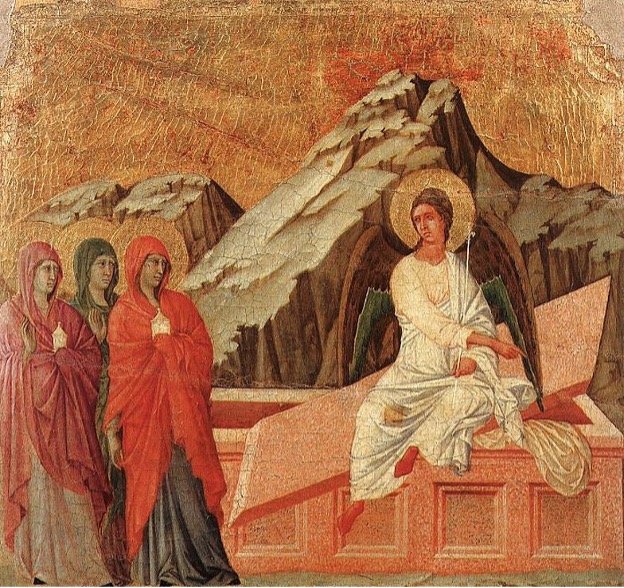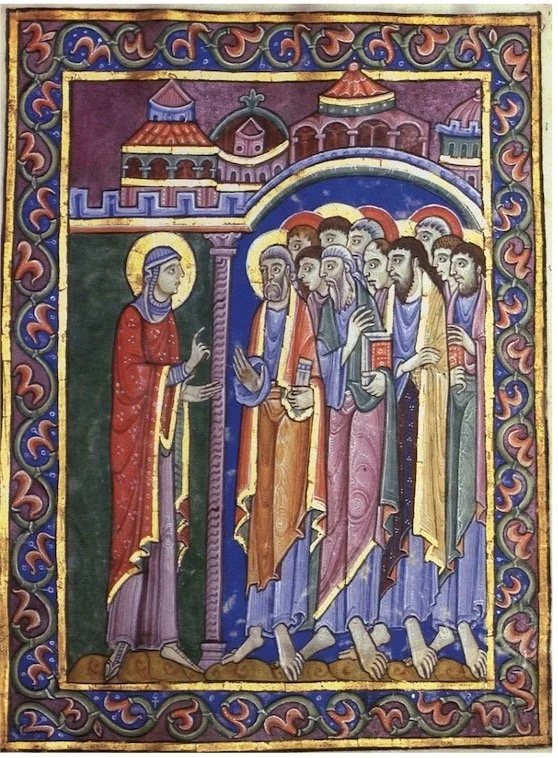
The Rule of the Companions
Why Mary Magdalene?
Mary Magdalene experienced healing through her encounter with Jesus.
She walked with Jesus through his life, and stood at the foot of the cross. She went to the tomb expecting to find death, and found new life instead. She was sent by Jesus to tell the other disciples the good news of resurrection. In the Eastern Church, she is known as the Apostle to the Apostles. She spoke of the resurrection to those who would not believe her, undeterred by ideas of women’s place. She followed Jesus in life and beyond, and carried the message to all who would hear.
Our Call and Mission
With Mary Magdalene, we live on the border between what has been and what is emerging.
We feel ourselves blessed in the renewal and healing offered by knowing Jesus. We follow Jesus through the fear and pain of misunderstanding, rejection, and danger. We stand at the door of the tomb, the hinge between life and death. We proclaim resurrection to a Church whose form is changing in ways it cannot plan or even foresee. We look for the lost or forgotten, those the existing Church has not reached. We proclaim resurrection to those locked in the upper room of the Church, and the gift of God’s love to those who have turned away. We announce God in our midst, and seek to make God’s presence known through our common life and our ministry.
“I have seen the Lord!” —John 20:18
Our mission is to proclaim the renewing and transforming power of encountering Christ in our lives and in the world. Like Mary the Apostle, we announce the good news of new life whenever, however, wherever we can. We announce resurrection through the way we live as much as through what we say. With St. Francis, we “preach the Gospel – and when necessary, use words.”
The Vows
“Our hearts are restless, until they can find their rest in you.” —Augustine’s Confessions
The desire for God is the undergirding of our life, the true call out of which all particulars flow. Vowed Companions commit to continual conversion of life under the vows of poverty, chastity, and obedience.
The particular vows are understood not as legal restrictions or obligations, but primarily as a path to that conversion that leads us to see and respond to God’s call. Their purpose is to free us for abundant life and service. We open ourselves to gratitude and joy by becoming vulnerable to the Spirit working within and among us.
Conversion, turning to God, is a lifelong endeavor. When we vow continual conversion, we promise to open ourselves to the Spirit working in us, so that we become all that God desires us to be. We commit to deepening prayer, to continual listening to one another, to letting go of all that stands between us and God. We ask each day what God is doing with us. Conversion manifests in the charism of the Companions in our lives and in our ministries.
Poverty
The vow of poverty opens us to receive God’s gifts in gratitude and humility. By renouncing private ownership, even in our hearts, we deepen our awareness that all we have and all we are flow from God. We also commit to be “of one heart and mind on the way to God” (Augustine), sharing our uncertainties as well as our joys. We are patient with ourselves and one another as we face the fear of scarcity and let go into deeper trust in God’s loving care. As we live into this vow, we are freed to share generously of what comes to us with others.
The vow of poverty does not celebrate the forced deprivation of those who do not have enough to sustain life. Rather, it opens our awareness that enough is plenty in God’s economy. We make decisions about our use of all that comes to us in the light of the Gospel's call to be a healing presence in the world.
Chastity
We acknowledge our sexuality as holy. By the vow of chastity, we offer our deepest capacities for relationship first to Christ, as a doorway into deeper relationships of loving and being loved. Through living into this vow, we let the fullness of love flow through us.
We pledge to forego sexual expressions of love in order to know more fully the passionate love of God and in order to be available to a wide variety of human relationships.
Chastity is a joy and a challenge as we live this gift from God. Celibate life demands communal support as well as persistent prayer if we are not to descend into superficiality and isolation. Fruitful chastity flows out of and into gratitude for the deepest relationship of our lives. This relationship with Christ is found through seeking Jesus face to face and in the faces of others.
Celibacy is not a superior vocation to that of committed relationships. All vocations lived with integrity open the way to Christ.
Obedience
Mary Magdalene’s message was ignored by the male apostles. Like them, we have been taught to discount women’s authority. As Companions, we seek to heal the distortions we have learned about authority and to build mature relationships. We strive, with God’s help, to trust one another and ourselves.
Listen with the Ear
of the Heart —Benedict
Obedience is listening to God in our hearts and among our community. By this vow we pledge to trust God speaking through the Rule, Constitutions, and governance of the Companions as well as through Scripture and tradition. We are challenged to lay down our desire to run everything and the anxiety that insists that we must do so. We also challenge the fears that block us from accepting responsibility and exercising authority.
Through obedience we enter into real dialogue with the Holy Spirit and with one another. We open ourselves to the possibility that the community is wiser than any one member, and that the Holy Spirit may speak through the newest as well as the most senior member. We are called to participate in the continuing creation of the community, and to use our gifts as needed. We celebrate the gift of authority as it contributes to our journey toward God’s reign.
We are to be active contributors to the common life. Offering our ideas and initiatives in a spirit of flexibility and generosity, including the willingness to be disappointed or frustrated, is a sign that we are free in our obedience.
Lifelong Formation
Initial formation prepares us for taking on the commitments and practices that give shape to our lives as Companions. These commitments and practices continue throughout our lives, deepening our conversion. This conversion leads to continual communal and individual flourishing.
We participate in ongoing formation through prayer, common worship, study, self-care, exercise, recreation, appropriate medical attention, spiritual direction, reconciliation, and mission to the world.
We commit to community study of scriptures and spiritual writings, as well as those of other disciplines, as part of our ongoing formation. Through such study we aim to listen for the Spirit’s urging us more and more toward a Christ-centered life.
We will continually endeavor to seek a faithful and healthy balance between all the aspects of our lives.
Life in Community
If it is possible, so far as it depends on you,
live peaceably with all. —Romans 12:18
One way we proclaim the message of resurrection is by how we live with one another. Life in community is both gift and challenge, fostering the conversion of life we vow.
Our shared life is a challenge to the individualism of contemporary culture. Our interdependence—our identity as members of One Body—is a reality that enables us to support and challenge each other to live the abundant life we are promised now, and in the world to come.
We must develop and maintain the capacity to forgive.
One who is devoid of the power to forgive
is devoid of the power to love. —Martin Luther King, Jr.
We endeavor to live the peace of Christ, loving one another and those who share our life. When there is conflict among us, we endeavor to respond to each other in a spirit that welcomes reconciliation, and we seek forgiveness when our speech or actions impact negatively on community life. We acknowledge that this is a process, and commit to seeing it through, following Jesus’ teaching and using contemporary practices of skillful communication to the best of our ability.
We proclaim resurrection through our commitment to healing and wholeness in body, mind, and spirit. This is not simply an individual endeavor. We are mindful of our shared responsibility to “encourage the faint-hearted and help the weak” (1 Thess. 5:14) by our example as well as our words. We welcome people on the journey of recovery, and we challenge one another to grow into the fullness of life promised by Jesus. We support one another on the way to health.
We strive to be mindful of the impact of our actions on those with whom we share this life, and we are open to other’s observations, acknowledgments, and concerns. We accept responsibility not only for our particular tasks and offices, but for tending to the general well-being of the community.
We commit to making our common life a priority, including worship, meals and recreation. We honor our need for time apart as well as time together. We value our friendships beyond the community and our familial bonds while agreeing to make choices in consultation with the community.
Corporate Prayer and Worship
Worship and prayer is the first priority of our common life.
We acknowledge God’s love, grace and power as the source of all we are and do, so consider presence worship as paramount. Absence is a hardship, for ourselves and for the community. We consult about anticipated absences, and avoid unscheduled ones.
The rhythm of our daily communal prayer life includes regular times of prayer as well as the celebration of the Holy Eucharist. These particular times call us back to Christ, and foster an attitude of prayer throughout the day. Each house is encouraged to make creative choices about the structure and content of these offices, consulting with the larger community. Those living in other arrangements will be mindful of their connection to other Companions and to the body of Christ as they pray.
Private Prayer
Our life together is rooted and grounded in prayer. Personal prayer is essential for our corporate worship to be authentic. Through our prayer we open ourselves to hear God speaking in our hearts throughout the day.
We listen for God speaking through Scripture, nature, and those with whom we live and serve. We offer ourselves to God, continually opening to the Spirit’s urgings and responding as we are able.
Prayer also frees us to trust God’s grace. Praying with Scripture reminds us of what God has done and spoken in the past, and gives us guidance and encouragement for the present. Praying for others opens us to see what we can do, and also reminds us that God is working in other ways when we cannot directly offer help. As we pray, God strengthens us to persevere and grow in faith.
We deepen our personal relationship with God through various devotions and contemplative practices. We let go of our specific concerns as we are awakened to God’s loving presence. We rest in this presence at specific times in order to be mindful of God’s presence at all times
Silence and Solitude
We seek to proclaim God’s love to all, and we commit to hospitality within and beyond the community, welcoming all as Christ and seeing God in one another. Yet hospitality must be renewed in us through regular periods of silence and solitude.
In silence we learn to face our fears and name our hopes. Living with others in silence enables us to know one another more deeply than mere words, and to offer one another the space to pray and reflect without hiding. Through silence, the peace of God can enter our homes. We are freed to rest, to pray, to read and walk without distraction.
This fruitful silence must be actively sought. The surrounding world will always claim our attention. We should be mindful of the encroachment of electronic media into our silence, guarding not only against external noise but also against unnecessary inner stimulation. We will seek to use electronic media for our mission and meaningful connection rather than to assuage loneliness or boredom. We keep periods of silence, as determined by each house, to create space for solitary work and allow uninterrupted time for work and reflection. Those of us who live alone are encouraged to use their solitude for renewal. Those living with others who are not Companions will make time for solitude and silence each day.
Work is love made visible.
—Kahlil Gibran
In order to ensure the space for silence and relaxation, each vowed Companions’ house will have a place of enclosure into which guests are not normally invited. If the architecture of the house does not allow for such enclosure, guests will be invited only with the prior consent of the members of that house.
Retreats
Retreat time is an essential part of the rhythm of our lives together.
Each Companion shall make time for retreat. Vowed Companions will schedule one day each month (or three days per quarter as the house decides), and shall have an annual house retreat of at least five days. In addition, each vowed Companion shall make an annual private retreat of at least five days.
Rest and Recreation
Remember the Sabbath
and keep it holy.
—Exodus 20:8
Even God rested. We can do no less. We are mindful of the injunction to take Sabbath time and allow for holy leisure. Only through real Sabbath can we honor God the other six days of the week.
Our common life includes regular time together to relax through conversation and shared entertainment. It is important to experience one another as whole persons, and not to relate solely through work or worship. The real quality of our common life will be evident at those times when we encounter one another without an agenda or purpose. We will encourage play and laughter in our houses. Each house will have regular periods of common recreation.
Care of the Self
“The glory of God is the human being fully alive.” - Irenaeus
As beloved children of God, we are called to honor our whole selves — bodies, minds, and spirits — as we grow toward embodying Christ.
Regular exercise, adequate rest, and appropriate medical care are essential elements of honoring God’s gift of life. Openness to education and dialogue about issues of mental, emotional, and physical health are part of our ongoing formation. We commit to seeking professional help when needed.
Our meals are opportunities for both silent reception of the gift of food and water, and time together in conversation. We seek to enjoy our meals in the context of faithful care of our bodies and spirits, as well as nurturing community life. We choose healthy food and drink in moderate quantities. We acknowledge the spiritual, emotional and physical benefits of attending to a rhythm of feasts and fasts.
Care of the Earth
Our love of God’s creation calls us to tread lightly and honor God’s creation.
As we detach from personal property, we grow in awareness of our collective responsibility for the earth. We seek to reduce waste, to recycle and compost whenever we can, and we seek wise use of the earth’s gifts. We pursue awareness and conversation around these issues as part of our proclamation of God’s healing power.
Governance of the Companions
We are a tapestry of many threads.
The Board of Directors has final authority over fiscal and fiduciary matters, as well as providing counsel, strategic planning and support. The vowed Companions decide matters of program, formation, and worship, with the advice and contribution of Candidates. At each level we seek the contribution of all, and we commit to listen to one another with respect and care.
Leadership is not the preserve of any one group, but is manifested by all in their various capacities. Those in official leadership positions will continually call out the gifts and skills of each member, inciting their strengths while patiently ministering to those in need. We will foster leadership by offering insight when appropriate and by serving in whatever capacity we can. We discourage gossip and criticism, and foster honest discussion and resolution of conflict.
Are you drawn to this Rule?
Discover pathways to Companionship



